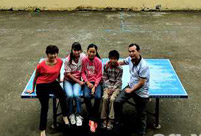SURVIVAL STRUGGLE
While private players have rushed to take a slice of the pie, many have not found it as tasty as it appears on the surface.
"Lack of supervision on pricing and program quality has made it difficult for companies that really want to produce high-end programs to earn money," says Gong Maicheng, general manager of Yuyuan Cultural.
In Gong's experience, audiences usually think high prices mean high quality; but without market supervision, this is not always the case. When the audience is cheated once, they are unlikely to return to a theater again. In this way, the market loses customers, high-quality programming loses profits and only speculators get the money.
Each year, Gong's company produces one children's drama with more than a million yuan of investment. "But so many rivals make children's drama with only hundreds of thousands of yuan. They price their show the same as ours or even higher, and parents don't know which is better for their kids," he explains.
In second-and-third-tier cities, Gong and his team often discover copycat posters and products related to their work, but he can do nothing to stop the rip-off merchants.
Government-backed arts organizations, on the other hand, begin on a much stronger financial footing.
Ji Xiaolan, a singer and the president of the Shanghai Hailin Jazz Orchestra, says what bothers her and fellow presidents of private troupes is lacking government support.
"The country does not value private troupes, as it still puts so many resources into supporting state-run groups," according to Ji.
After six years of hard work, she and her orchestra have won loyal fans in Shanghai, but touring the country is still financially difficult.
"The government should increase subsidies so that private troupes can survive," she believes. But the singer adds that the government should also introduce an assessment system in order to rule out less-qualified operators and give more support to quality programs.
"The district government in Shanghai now gives each private troupe 20,000 yuan a year, no matter what programs they are offering. It's not helping development of private troupes, and it does no good to regulate the performing market," Ji says.
For Li Xiaojie and her competitors based in the southern city of Shenzhen, the government input they are calling for also includes the building of more theaters.
In 10 years, the number of performances staged annually in Shenzhen has increased from 20 to nearly 600, but the blossoming performance scene hasn't led to better venues.
"Theaters are state-run and performance schedules are easily disrupted when there are conferences and meetings to be held. In those cases, we lose money for sure," Li explains.
She adds that because local theaters are small, she has to raise ticket prices to make ends meet, but costly tickets may result in a decline in audience. "It's a vicious cycle."


 No news of survivors in Lao Airlines crash
No news of survivors in Lao Airlines crash China's destroyer Qingdao sails out of Sydney Harbor
China's destroyer Qingdao sails out of Sydney Harbor Chinese tycoon aims to restore London's Crystal Palace
Chinese tycoon aims to restore London's Crystal Palace Admirers to bid joyful goodbye to Rubber Duck
Admirers to bid joyful goodbye to Rubber Duck Photo story: For the last three students
Photo story: For the last three students  Photo story: A day in the life of a car model
Photo story: A day in the life of a car model Chinese screen goddesses from Beijing Film Academy
Chinese screen goddesses from Beijing Film Academy  Weekly Sports Photos
Weekly Sports Photos World's most amazing yacht on display in Guangzhou
World's most amazing yacht on display in Guangzhou Photo collection of Chinese Navy
Photo collection of Chinese Navy Cold air sweeps through N China
Cold air sweeps through N China The last family in shantytowns
The last family in shantytowns UNESCO world heritage site: Montale Tower
UNESCO world heritage site: Montale Tower U.S. Senate leader announces bipartisan deal
U.S. Senate leader announces bipartisan deal Fiber-optic wedding dress show shinning in Suzhou
Fiber-optic wedding dress show shinning in Suzhou Day|Week|Month